Did you know that ferrets have sharp teeth and a tendency to nibble? Despite their adorable and cuddly exterior, these furry animals can be quite feisty. It may come as a surprise to some that ferrets are capable of biting, causing worries about their suitability as pets. However, fear not! We are here to offer insights into the intriguing realm of ferret behavior and offer helpful advice on how to manage and address biting habits.
Key Takeaways:
- Ferrets may bite for various reasons, such as exploration, teething, fear, dominance, or medical issues.
- Training kits from a young age can help prevent biting behavior and ensure proper socialization.
- Dealing with biting in adult ferrets may require patience, trust-building, and a safe environment.
- Fear biting in ferrets can be addressed through gentle approaches and reward-based training.
- Play biting can be redirected to appropriate toys, and understanding communication signals can prevent biting incidents.
Reasons Why Ferrets Bite
Ferrets are known for their playful and curious nature, but sometimes they might exhibit biting behavior. Understanding the reasons behind ferret biting is crucial for creating a safe and harmonious environment for both the ferret and its human companions. Let’s explore some common reasons why ferrets bite and how to address them effectively.
1. Biting during exploration: Kits, or baby ferrets, often nip as they use their mouths to explore their surroundings. This behavior is natural for them as they are curious about their environment. It is important to redirect their biting behavior towards appropriate toys and discourage them from nipping human skin.
2. Biting due to teething: Just like human babies, ferret kits go through a teething phase, which can cause discomfort. During this period, they might bite more frequently to alleviate teething pain. Providing them with suitable teething toys and frozen treats can help ease their discomfort and prevent them from biting inappropriate objects or people.
3. Biting out of fear: Some ferrets may resort to biting when they feel threatened or fearful. This behavior can be a defense mechanism to protect themselves. Taking a gentle and patient approach when handling fearful ferrets, and gradually exposing them to new experiences can help reduce their fear and minimize biting incidents.
4. Biting to assert dominance: Ferrets are social animals and have a hierarchical nature. In a group setting, they may bite to establish dominance or to communicate their position within the hierarchy. Proper socialization and supervision can help manage these behaviors and prevent aggressive biting.
5. Biting due to medical issues: Ferrets with certain medical conditions, such as dental problems or other sources of pain and discomfort, may resort to biting as a way to express their discomfort. It is important to have regular veterinary check-ups and address any underlying health issues promptly to prevent biting associated with pain.
Ferret Biting Behavior: A Comprehensive Overview
Understanding and addressing ferret biting behavior requires patience, observation, and providing appropriate outlets for natural behaviors. By identifying the underlying cause of biting, whether it’s exploration, teething, fear, dominance, or medical issues, you can take proactive steps to prevent and manage biting incidents. Positive reinforcement, proper handling techniques, and creating a safe and stimulating environment are integral in fostering a harmonious relationship with your ferret.
| Reasons | Description |
|---|---|
| Exploration Biting | Kits may nip during exploration |
| Teething | Kits may bite to alleviate teething discomfort |
| Fear | Ferrets may bite when feeling threatened or fearful |
| Dominance | Ferrets may bite to establish dominance |
| Medical Issues | Biting can be a result of pain or discomfort |
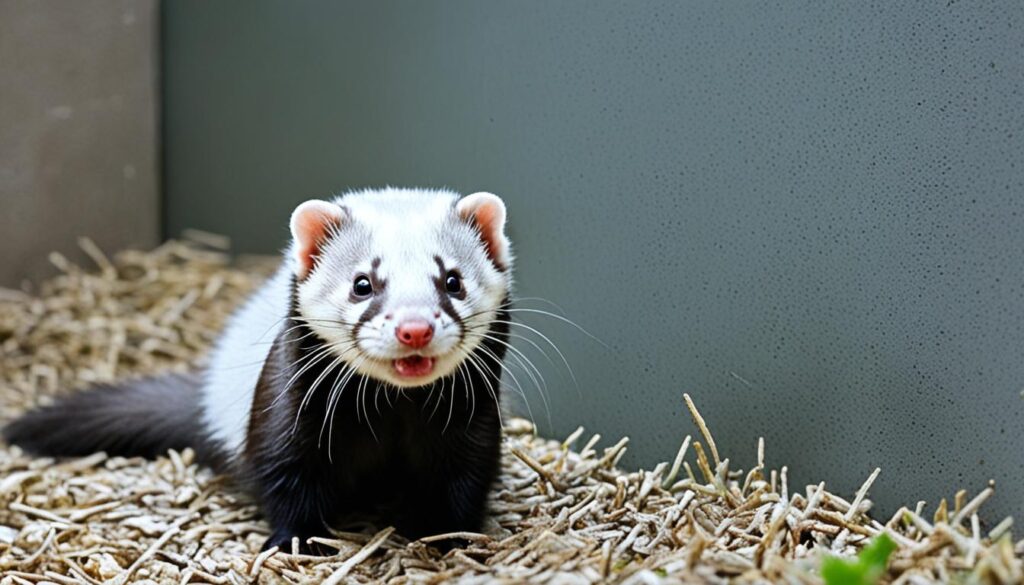
Training Kits to Prevent Biting
When it comes to preventing biting behavior in ferrets, training is key, especially when they are young kits. By starting their training early on, we can effectively discourage biting and set the foundation for a well-behaved and socialized ferret. Patience and consistency are essential during this process. Remember, each kit is unique and will learn at their own pace, so it is important to approach their training with understanding and flexibility.
Socializing kits and teaching them appropriate interaction with humans is a critical component of preventing biting. Introducing them to various environments, people, and experiences helps them become familiar with different stimuli and reduces their likelihood of feeling threatened or fearful. By exposing them to positive, controlled social situations, we can help them develop confidence and minimize aggressive behavior.
Positive reinforcement techniques are particularly effective when training kits to prevent biting. Using rewards such as treats or verbal praise when they display calm and non-biting behavior reinforces the desired actions. This approach encourages them to associate positive experiences with appropriate interactions, further reinforcing good behavior. On the other hand, it is crucial to avoid any form of punishment or aggression during training, as this can escalate fear or anxiety and lead to even more biting.
Sample Training Schedule for Kits
Here is a sample training schedule to help you get started with preventing biting behavior in kits:
- Handle the kit gently and provide a safe, comfortable environment for interaction.
- Introduce the kit to new sights, sounds, and smells gradually, ensuring they feel secure.
- Offer treats and praise when the kit displays calm and non-biting behavior.
- Redirect their attention to appropriate toys or objects when they show signs of wanting to bite.
- Consistently reinforce positive behaviors and discourage biting by immediately removing attention or redirecting focus when they exhibit biting behavior.
- Practice regular socialization with supervised playdates or visits to other ferret-friendly homes.
- Continue training and reinforcing positive behavior as the kit grows, adjusting the training techniques based on their progress and individual needs.
Remember, training kits to prevent biting is an ongoing process that requires dedication and patience. By using positive reinforcement, socialization, and consistent training, you can help your kit develop into a well-behaved and gentle ferret.
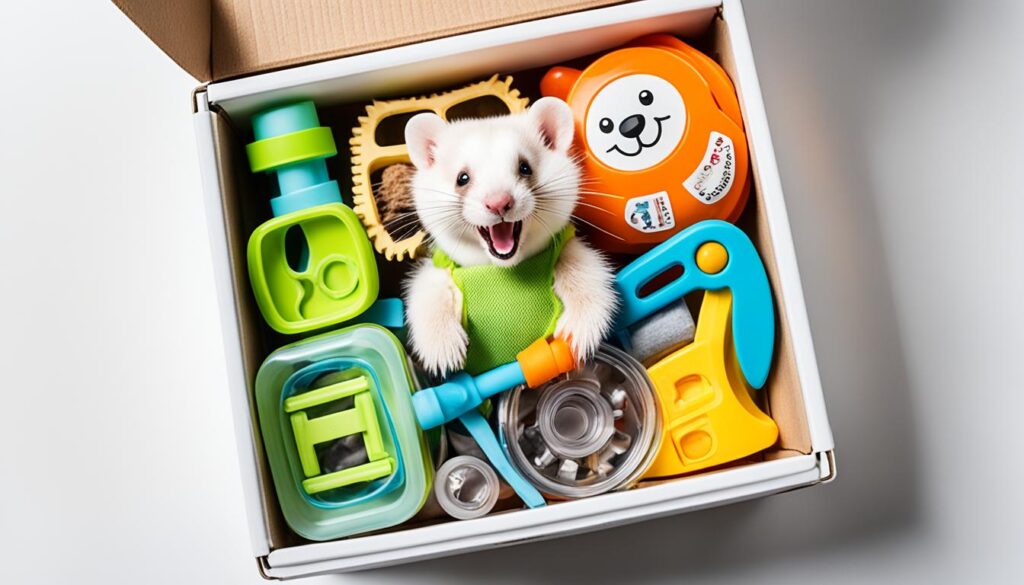
Dealing with Biting in Adult Ferrets
When it comes to adult ferrets displaying biting behavior, it may require more time and effort to address their habits effectively. However, with proper handling, trust-building, and creating a safe environment, you can help prevent biting in adult ferrets.
To address biting in adult ferrets, it is essential to approach the situation with patience, firmness, and gentleness. Remember, ferrets are intelligent creatures that respond well to positive reinforcement techniques.
Proper Handling
One of the key factors in dealing with biting behavior is learning how to handle adult ferrets properly. By supporting their body and minimizing sudden movements or reactions, you can help them feel secure and reduce the likelihood of biting. Gentle and careful handling is crucial to establish trust and prevent fear-based biting.
Building Trust
Building trust with adult ferrets is vital in curbing their biting tendencies. Take the time to spend quality bonding moments with them, such as playing and providing treats. By consistently showing them love, care, and respect, you can foster a stronger bond and minimize biting behavior.
Creating a Safe Environment
Providing a safe and secure environment is essential for adult ferrets. Ensure that their living space is free from potential hazards and stressors that may trigger biting behavior. A well-designed and enriched environment, with plenty of toys and mental stimulation, can also reduce boredom and the likelihood of biting.

Remember, adult ferrets may require additional time and effort to overcome biting habits. With patience, consistency, and a gentle approach, you can work towards minimizing biting behavior in adult ferrets and create a harmonious relationship based on trust and mutual respect.
Fear Biting in Ferrets
Some ferrets may exhibit fear biting due to past traumatic experiences or lack of confidence. Fearful ferret behavior can be challenging to address, but with patience and proper techniques, it is possible to help them overcome their fears.
When dealing with fear biters, it is important to approach them gently and create an environment of trust. Avoid making sudden movements or loud noises that may startle or trigger their fear response.
One effective method to address fear biting is through reward-based training. By using positive reinforcement techniques, such as treats and praise, you can gradually build their confidence and associate positive experiences with human interaction.

Acclimation techniques can also be helpful in reducing fear biting behavior. Introduce new experiences and environments slowly, allowing the ferret to become familiar and comfortable at their own pace.
To illustrate these approaches, refer to the following table that outlines strategies for addressing fear biting in ferrets:
| Techniques to Address Fear Biting | Benefits |
|---|---|
| 1. Gentle and patient approach | – Builds trust and reduces fear |
| 2. Reward-based training | – Associates positive experiences with human interaction |
| 3. Gradual acclimation to new experiences | – Reduces anxiety and fosters confidence |
By implementing these techniques and providing a supportive environment, ferret owners can help fearful ferrets overcome their fears and reduce fear biting behavior.
Play Biting in Ferrets
Ferrets are known for their playful nature, and play biting is a common behavior exhibited during playtime. When ferrets play, they may occasionally nip or gently bite as a form of interaction. Understanding this behavior is essential for both the ferret’s well-being and the owner’s enjoyment of playtime.
Play biting is different from aggressive biting, which is characterized by a ferret biting with force, aggression, or intention to harm. Play biting, on the other hand, is usually gentle and does not cause harm or pain.
To manage play biting effectively, it is important to establish clear boundaries and redirect the ferret’s biting behavior onto appropriate toys or objects instead of human skin. This can be achieved by providing a variety of interactive toys and engaging in play sessions with the ferret.
“Redirecting the ferret’s biting behavior onto appropriate toys or objects instead of human skin is key to managing play biting effectively.”
When the ferret playfully bites during playtime, it is best to ignore the behavior. Reacting strongly by shouting or pulling away may inadvertently reinforce the behavior, as it provides attention and interaction. Instead, remain calm and still, avoiding any sudden movements that may excite the ferret further. By withholding attention, the ferret learns that biting does not elicit the desired response.
Once the ferret stops biting and exhibits calm behavior, reward them with praise and treats. Positive reinforcement helps to reinforce desirable behavior and can help deter play biting in the long run.
In addition to redirecting and rewarding, it is important to provide ample opportunities for exercise and mental stimulation. Ferrets have high energy levels and need regular play sessions to channel their energy in a positive way. Engaging in interactive play, such as chasing toys or playing hide-and-seek, can help satisfy their instinct to play and reduce play biting tendencies.
“Regular play sessions and ample opportunities for exercise can help reduce play biting tendencies in ferrets.”
Remember, ferrets are social animals, and play is an essential part of their daily routine. By understanding and managing play biting behavior appropriately, we can foster a harmonious and enjoyable playtime experience with our ferret companions.
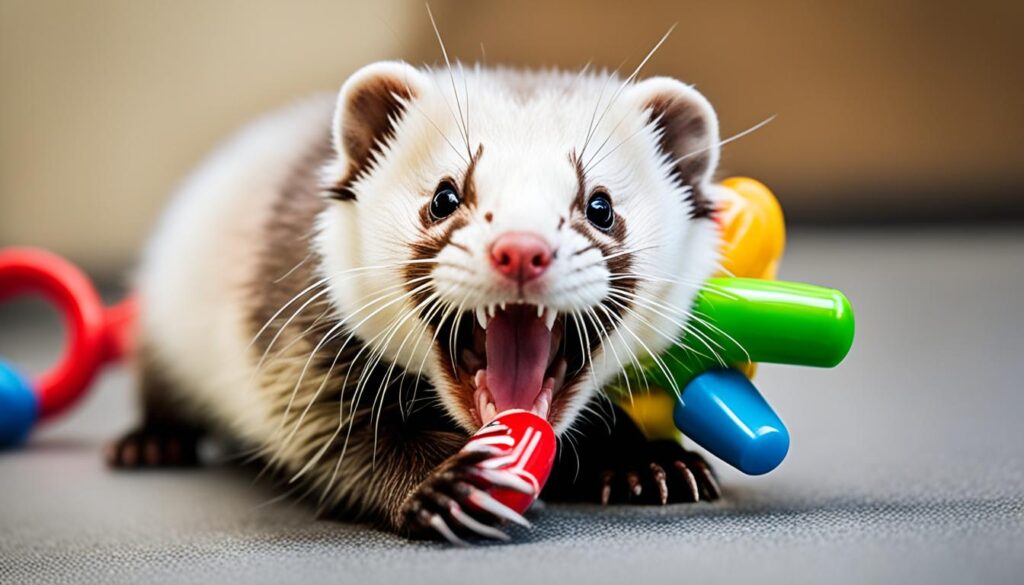
| Tips for Managing Play Biting in Ferrets |
|---|
| Establish clear boundaries and redirect biting onto appropriate toys or objects. |
| Ignore play biting when it occurs, avoiding any strong reactions. |
| Reward calm behavior and provide positive reinforcement. |
| Engage in regular play sessions to satisfy their high energy levels. |
Communication Signals and Biting
Ferrets have a unique way of communication, and sometimes biting is used as a means to convey their messages. However, it’s important to note that biting isn’t the sole form of communication for ferrets. They also exhibit various other signals to express their needs and emotions. By understanding these communication signals and promptly responding to them, you can prevent biting episodes in your ferret and maintain a harmonious bond.
Nuzzling:
One common communication signal that ferrets use is nuzzling. It’s their way of seeking attention or affection from their owners. Nuzzling can be accompanied by chirping noises or gentle paw touches. By recognizing these gestures, you can fulfill your ferret’s need for interaction, reducing the likelihood of biting.
Waiting for Attention:
Ferrets often exhibit patience to get what they want. You may notice your ferret sitting calmly or following you around, waiting for your attention. This is a clear indication that they want to engage with you. By acknowledging their presence and spending quality time together, you can satisfy their need for companionship and decrease the likelihood of biting.
“Understanding and responding to your ferret’s communication signals is crucial in preventing biting incidents. By recognizing the subtle cues they display, such as nuzzling and waiting for attention, you can fulfill their emotional needs and build a strong bond built on trust and understanding.”
It’s important to note that every ferret may have its unique set of communication signals. Observing your ferret’s behavior and being attentive to their needs will help you develop a deeper understanding of their specific signals. By responding appropriately and providing a nurturing environment, you can effectively prevent biting and foster a happy and communicative relationship with your ferret.
When your ferret communicates through behaviors other than biting, it’s crucial to respond promptly and address their needs. By doing so, you establish a clear line of communication and create a bond of trust and understanding.
Next, let’s take a look at some preventive measures you can implement to reduce the likelihood of biting incidents in your ferret.

Preventive Measures for Biting
When it comes to preventing biting in ferrets, proactive measures can go a long way in ensuring a safe and harmonious environment. By providing appropriate care and addressing their natural behaviors, you can minimize the likelihood of biting incidents.
1. Enrichment and Toys
Ferrets are active and intelligent animals that require mental and physical stimulation. Providing a variety of toys and outlets for their natural behaviors can help prevent boredom and frustration that may lead to biting. Toys such as tunnels, puzzles, and interactive games can engage their curiosity and keep them entertained for hours.
2. Regular Socialization
Regular socialization is essential for ferrets. Exposing them to different environments, people, and animals from a young age can help them become more comfortable and less likely to bite out of fear or anxiety. Gradual introductions and positive experiences during socialization can build their confidence and reduce aggressive tendencies.
3. A Safe and Stimulating Environment
Creating a safe and stimulating environment is crucial for preventing biting. Ferrets need plenty of space to explore, climb, and play. Ensure their enclosure is secure, free of potential hazards, and offers different levels and hiding spots. Additionally, providing a consistent routine and opportunities for exercise can help alleviate pent-up energy that may trigger biting behavior.
4. Consistent Positive Reinforcement Training
Positive reinforcement training is effective in shaping desirable behavior and discouraging biting. Rewarding good behavior, such as gentle interactions and appropriate play, can reinforce positive habits. Conversely, it is important to avoid punishment or aggression, as it can lead to fear-based biting and damage the ferret-owner relationship.
5. Ferret-Safe Households
Creating a ferret-safe household is crucial for their well-being and preventing biting incidents. Ferret-proofing your home by blocking off small spaces, securing electrical cords, and removing potential hazards can help minimize the risk of accidents or injuries that may trigger defensive biting.
6. Veterinary Care
Maintaining regular veterinary care is essential for ferret health. Regular check-ups can help identify any underlying medical conditions that may cause pain or discomfort, leading to biting behavior. Addressing these health issues promptly can alleviate their discomfort and reduce the likelihood of biting.
| Preventive Measures for Biting | Description |
|---|---|
| Enrichment and Toys | Provide a variety of toys and outlets for natural behaviors. |
| Regular Socialization | Expose ferrets to different environments, people, and animals. |
| A Safe and Stimulating Environment | Create a secure environment with ample space and mental stimulation. |
| Consistent Positive Reinforcement Training | Use positive reinforcement to shape desirable behavior and discourage biting. |
| Ferret-Safe Households | Ferret-proof your home to minimize potential hazards. |
| Veterinary Care | Maintain regular check-ups to address any underlying medical conditions. |
By implementing these preventive measures, you can create a safe and comfortable environment for your ferret, reducing the likelihood of biting. Remember that each ferret is unique, so it’s important to observe their behavior, provide them with appropriate care, and seek professional advice if needed.
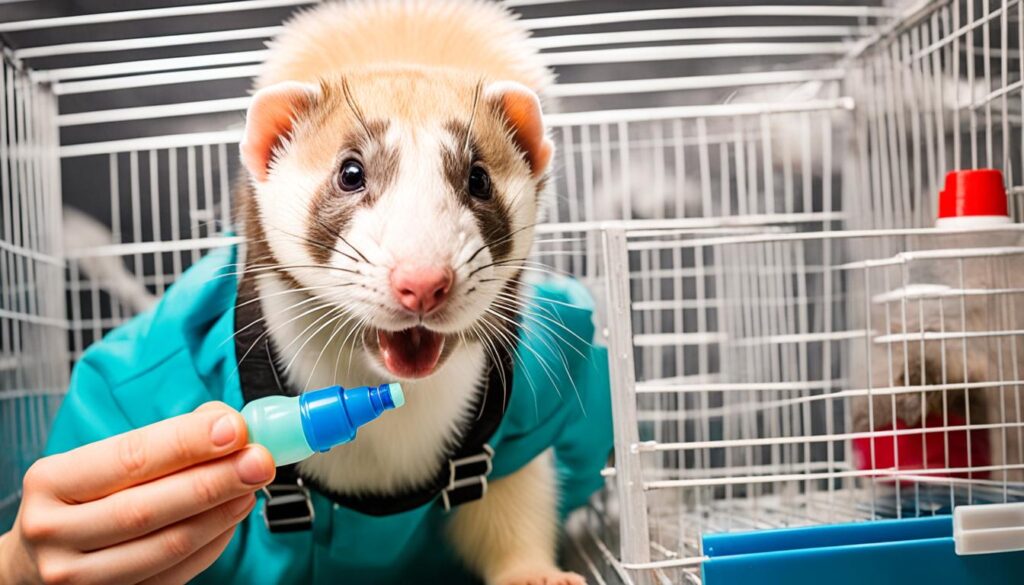
Handling Ferrets Safely
Proper handling techniques are vital for ensuring the safety of both ferrets and their handlers. By following these guidelines, you can prevent biting incidents and establish a trusting relationship with your ferret.
When handling a ferret, it’s important to support their body, especially their back end, to help them feel secure. Avoid any sudden movements or reactions as these may startle the ferret and increase the likelihood of biting. Remember, gentle and calm handling is key to building trust.
Here are some tips for safe ferret handling:
- Approach with care: Before picking up a ferret, make sure they are calm and relaxed. Approach them slowly and speak softly to let them know you mean no harm.
- Support their body: When lifting a ferret, place one hand under their chest and the other hand under their hind end. This way, you can provide stability and support to prevent any accidental falls or injuries.
- Avoid restrictive holds: Refrain from squeezing or restraining a ferret tightly. They need freedom of movement to feel comfortable and secure.
- Know their comfort zones: Observe your ferret’s body language and respect their personal space. Some ferrets may not enjoy being held for long periods, while others may feel more relaxed when wrapped in a towel or blanket.
Remember, each ferret is unique, and it’s essential to understand their individual preferences and comfort levels. Taking the time to handle your ferret gently and with care will help to establish a bond based on trust and prevent fear-based biting.
In the words of ferret enthusiast Byron O’Conner:
“Ferrets are incredibly agile and delicate creatures. Handle them with love and respect, and they will reward you with their playful nature and unwavering affection.”
| Handling Tips | Benefits |
|---|---|
| Gently support the ferret’s body | Prevents accidental falls and injuries |
| Avoid sudden movements or reactions | Reduces the likelihood of biting due to fear or stress |
| Respect their personal space | Helps establish trust and a sense of security |
| Observe their comfort zones | Allows for individual preferences and reduces anxiety |
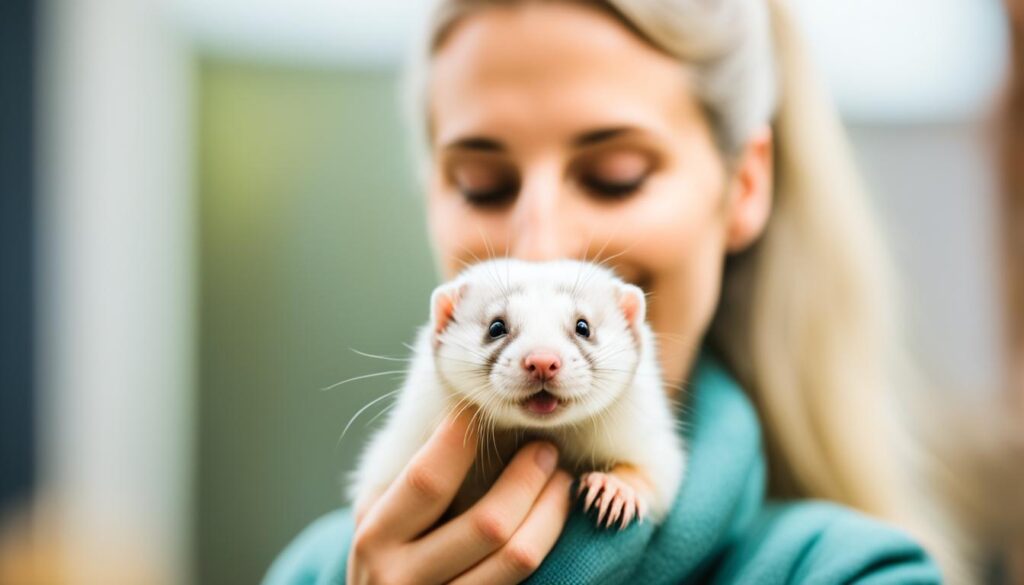
Ferret Behavior: Frolicking and Sleeping Patterns
Understanding ferret behavior is essential for fostering a strong bond with your furry companions. As pet owners, it’s important to navigate their interactions with insight into their unique characteristics. Ferrets are known for their playful frolicking, which is an expression of joy and excitement. Witnessing their energetic leaps and bounds can bring a smile to anyone’s face.
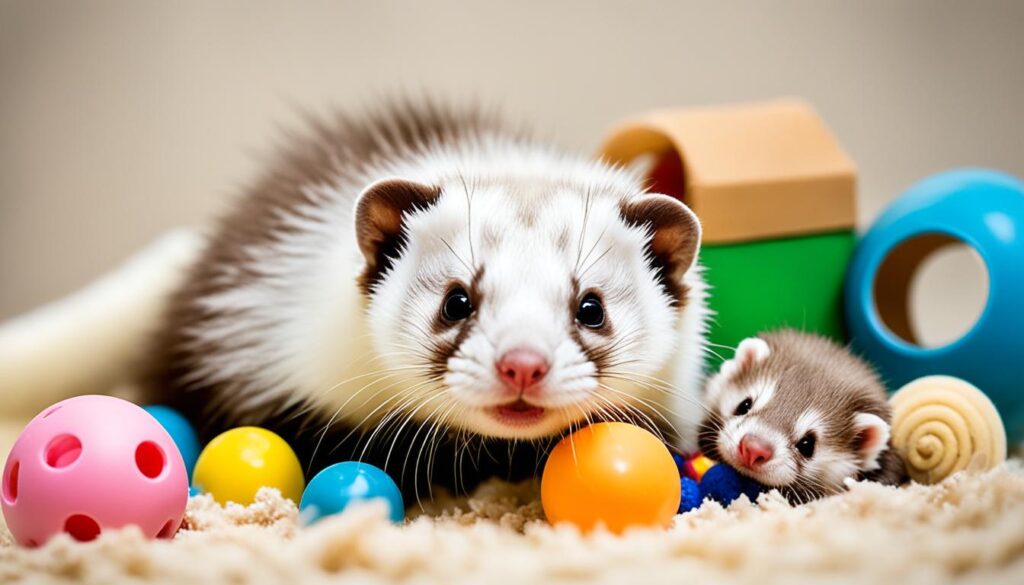
Additionally, ferrets have distinct sleeping patterns that may surprise some pet owners. They often fall into deep, relaxed sleep, which can sometimes be mistaken for unconsciousness. During these resting periods, their bodies become limp, their breathing slows down, and they may even twitch or make small noises. It’s essential to understand and appreciate these natural behaviors to provide appropriate care and support for your ferrets.
Conclusion
Understanding ferrets and preventing biting behavior is crucial for building a strong bond with these playful and affectionate companions. By taking a patient and consistent approach, while considering their natural behaviors, we can create a safe and harmonious environment for our furry friends.
To prevent biting, it is important to address the underlying causes. Whether it’s teething, fear, or communication, identifying the root cause will help us implement the right training techniques. Positive reinforcement training, along with regular socialization and a stimulating environment, can go a long way in preventing biting and creating a trusting relationship.
Proper handling is also a key factor in preventing biting incidents. By gently supporting their bodies and minimizing sudden movements, we can help our ferrets feel secure and reduce the likelihood of fear-based biting. By understanding their unique behaviors, such as frolicking and sleeping patterns, we can provide them with the care they need.
In conclusion, with understanding, patience, and proper training techniques, we can ensure that our ferrets become wonderful companions without excessive biting behavior. By taking these preventive measures, we can create a bond built on trust, respect, and a mutual understanding of each other’s needs.









